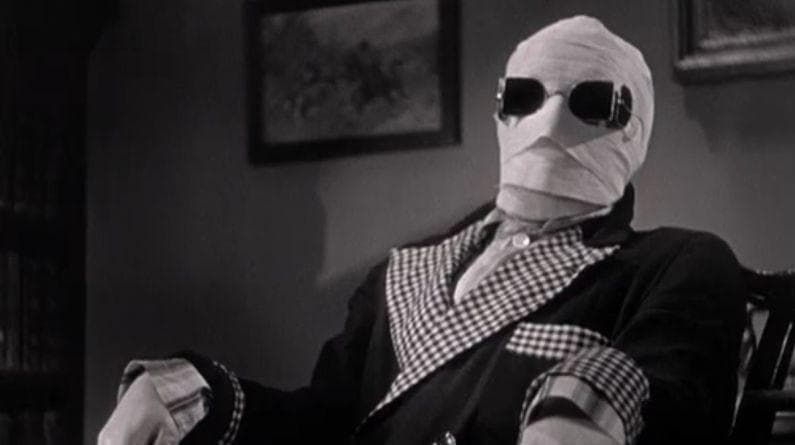-
(#9) The Many Strange Secrets Revealed By The Case Of The Dark Knight Rises
People are really into Batman, and especially Christopher Nolan's Dark Knight trilogy. So much so, in fact, a furor arose on Rotten Tomatoes in the lead-up to The Dark Knight Rises, which you read all about in "This Is Why We Can't Have Nice Things," a letter from RT editor-in-chief Matt Atchity.
The calamity began when a negative review for the film appeared on the site. Heaven forbid! Someone doesn't like an overtly fascist film about a billionaire ninja dressed as a bat! That review was written by Marshall Fine, about whom Atchity wrote, "he’s got a respectable background in criticism, and we think he should be included on our site." Fine was taken to task in the Rotten Tomatoes comments section, then, suddenly, his review disappeared from the site. Was a conspiracy underfoot by Rotten Tomatoes to support Warner Bros., which once owned the site and released the Dark Knight films?
That remains unclear. Atchity says no, that the review was removed at Fine's request, because he got so much hate traffic to his site it crashed. His negative assessment would still figure into the critics' rating for the film. Okay, fine. But the plot thickens. Comments were disabled for a few days on The Dark Knight Rises RT page, then a dude named Eric D. Snider posted a review labeled as coming from Top Critic-worthy site Film.com but actually posted on his own personal website.
Wrote Atchity:
"He thought it would be funny to post a negative review link on Rotten Tomatoes that links to his own site. He misrepresented his review link. (In case you didn’t know, some critics post their own reviews, and my staff posts some — it’s about 50/50). By attributing the link to Film.com, he misrepresented that organization. This is not the first time he’s done this. In our opinion, by knowingly posting a link that isn’t a review (and he hadn’t seen the movie), Snider has abused our trust, and therefore, his reviews will no longer apply to the Tomatometer."
There's a lot to unpack here. Firstly, reviewers can post themselves to Rotten Tomatoes, without any oversight. Which means you could ostensibly borrow a friend's login and post a troll review that goes into a percentage that might ruin a film's box office chances. That's cool.
On top of that, of this Snider character, Atchity wrote, "This is not the first time he’s done this." Hmm. Okay. So not only can critics login and post their own reviews, they can post troll reviews erroneously attributed to Top Critic accounts more than once before being prevented from posting again. That's, ah, maybe alarming is the right word?
Yet Atchity promises RT is trying to do the right thing. "If a critic often goes against the majority, but has well-reasoned arguments, it’s unlikely we’re going to ban them, at least not just for having a different opinion. We’re not looking for groupthink here."
If you're wondering, The Dark Knight Rises has an 87% on Rotten Tomatoes, though it should be pointed out it has 334 reviews, and only 53 of those come from Top Critics. Of the 44 negative reviews, 13 are from Top Critics. So, it has a 76% with people who actually know what they're talking about, and of that group, a lot had negative things to say about it (Roger Ebert: "The film begins slowly with a murky plot and too many new characters").
-
(#3) The Site's Historical Perspective Is Super Screwy And Might Mess With Your Head
Rotten Tomatoes has all the movies. There's stuff from the 1920s on there and stuff that hasn't come out yet. And all these movies are lumped together under the same grading system, despite some of them being rated by glowing retrospectives offering historical context and social significance, and others being rated on a the basis of a single viewing (maybe on a day during which a reviewer saw five other movies) and with an inability to fully understand social and historical perspective.
Here's where Rotten Tomatoes lies to you: according to an analysis of Rotten Tomatoes data by the good folks at Slate,
"Tomatometer rating is strongly influenced by its age. Films from the 1920s, for instance, have an average Tomatometer rating around 91 percent, while films from the 1990s average around 55 percent. Movies might have gotten worse since the Great Depression, but not that much worse. The golden-oldies effect may be explained by a bias toward reviewers reviewing, or Rotten Tomatoes scoring, only the best movies from bygone eras. Rotten Tomatoes includes a score for Casablancafrom 1942, for example, but leaves out clunkers from the same year like The Corpse Vanishes and Lady Gangster."
On top of this, there's a huge difference between a review, written as an immediate reaction to something and with no real purpose other than to tell a readership whether or not to see and movie and why, and a piece of film criticism. You can see these differences when comparing scores and consensus on movies.
Everyone loves the Toy Story films. Only a cynic could hate them. From a critical perspective, they're well-structured, visually innovative, and have solid jokes and performances. They're also damn entertaining. It's easy to overlook any flaws.
The first Toy Story has a Rotten Tomatoes rating of 100%. The consensus reads "Entertaining as it is innovative, Toy Story reinvigorated animation while heralding the arrival of Pixar as a family-friendly force to be reckoned with." That's what you call historical perspective, and film criticism. The film changed animation, and is rightfully regarded as a watershed moment.
Toy Story 2 also has a Rotten Tomatoes rating of 100%. The consensus reads "The rare sequel that arguably improves on its predecessor, Toy Story 2 uses inventive storytelling, gorgeous animation, and a talented cast to deliver another rich movie going experience for all ages." That is a review. You see the difference, right?
La Dolce Vita, widely regarded as one of the greatest movies of all time, has a Rotten Tomatoes rating of 97%. Dave Kehr of the Chicago Reader and Stanley Kauffman of The New Reader are the sole dissenters, and both raise philosophical objections with what director Federico Fellini says in the film. Should you believe, because two film critics take exception fo the point Fellini makes, La Dolce Vita is a lesser film than Toy Story or Toy Story 2? And, in the case of Toy Story 2, is it fair to compare relatively short reviews to lengthy, thoughtful film criticism of a philosophical nature, as La Dolce Vita faced?
-
(#2) Everyone’s A Critic, Literally
So who counts as a critic on Rotten Tomatoes? Are you reading a consensus based on reviews written by people who really know what they're talking about? Who work for top publications, have seen thousands of movies, studied film or film studies, know all the correct terminology and points of reference, and understand how the medium works and what makes a genuinely, objectively good movie? Or are you reading a bunch of drivel peddled by fans who used the Internet to weasel their way into critical discourse by espousing the opinions of fellow fans and thereby gaining readership, support, and, because of that, ad revenue, studio approval, and legitimacy?
Reviews from print publications across America make the cut, but how does the site deal with Internet scribbling? According to Rotten Tomatoes, "Online publications must achieve and maintain a minimum 500,000 unique monthly visitors according to comScore, Inc or Nielsen Net Ratings and reviews must have an average length of at least 300 words." Sure, 500,000 seems like a big number, but with sites pulling down tens of millions of unique visitors every month, it isn't, really. And you can apply to be a Rotten Tomatoes-approved reviewer right there on the site.
Everyone sees movies. You see a movie, you think, "I didn't like that." That's your subjective, probably uniformed (no offense, but it's true) opinion, not film criticism. Still, you might be inclined to tell the world about it via the Internet. If other people with your subjective opinion agree with you and you earn yourself a lot of readers because of that, you can get your reviews featured right there on Rotten Tomatoes alongside people with 20 years experience and a degree in film studies. You might not be a Top Critic, but who actually pays attention to those distinctions? Suddenly, your subjective, uninformed opinion is equally as valid as far more objective reviews from actual film critics.
As Box Office analysis reveals, negative Rotten Tomatoes scores have an impact on the success of a film. Let's say you and all your fellow fan reviewers give a movie negative reviews. That's tantamount to you saying a filmmaker should've done something different, right? That you know better than filmmakers what makes a good film. And maybe that's right. Who knows. But it probably isn't.
To put this in perspective, pretty much everyone except the homeless live in a building of some kind, right? You write your movie reviews at a desk in an apartment. Say there's something that annoys you about the layout of your building. You haven't studied architecture or structural engineering, have you? Probably not.
Do you feel emboldened to state your subjective opinion on these perceived problems with your building in a public forum, in such a way that would have a negative impact on an architect or engineer? Do you think you should really be telling these people what to do, or will you just sit silently and think, "I don't like this, but I should let the people who know what they're talking about do their jobs"?
-
(#7) Audience Scores Don't Correlate To Reviewer Scores
You might go on Rotten Tomatoes and check out both the critic score and audience score before deciding whether to see a movie. Maybe you're looking at The Promise, a 2017 historical epic about the Armenian genocide staring Christian Bale, Oscar Isaac, and Charlotte Le Bon, co-written and directed by Terry George, who made Hotel Rwanda.
As of April 2017, The Promise has a critics rating of 45%, with a consensus of "The Promise wastes an outstanding cast and powerful real-life story on a love triangle that frustratingly fails to engage." Not too promising. But the audience score is 89%! Hey, that's not bad. And you can see right there on the page, audience members are offered the opportunity to rate a movie on a scale of 1 to 5, and these scores are averaged into the rating.
Gonna get to the discrepancy of the score in a minute, but you can see right away how the score given by the audience rating (an average of direct votes made by visitors to the site) differs fundamentally from the critics' score (an average of 'good' or 'bad' assessments made based on the overall tenor of a review, which doesn't offer each critic the opportunity to give a grade for averaging). When you see these scores side-by-side, you might assume they correspond to one another. They do not.
Then you have score discrepancy. Reviewers must see a movie before writing a review and contributing to the Rotten Tomatoes critics' percentage. Not true for the audience. As Terry George explained at a press conference promoting The Promise, the movie had tens of thousands of negative reviews on Rotten Tomatoes and IMDb after just two screenings at the Toronto Film Festival. It's impossible that many people saw the film. So why that many votes? Because it's an inflammatory movie to deniers of the genocide. As George said, The Promise was extremely hard to get made due to the “enormous strategic value” of Turkey (the government of which country perpetrated the genocide).
Not long after the flood of negative votes poured in, The Promise got a flood of positive votes, apparently from Armenians and other supporters of genocide recognition. Before even being released, The Promise had 3,601 audience assessments on Rotten Tomatoes, and a mind-boggling 129,241 on IMDb (which recent history shows is an ideological battle ground fans descend on in the lead-up to a film's release).
-
(#5) The Rotten And Fresh Pass/Fail System Doesn't Really Make Sense
So, Rotten Tomatoes scores don't really correlate to a score you might get on a test. What if you take a class pass/fail? If your grade is above 60%, you pass the class, because you've gotten enough things right not to fail. The Rotten Tomatoes Fresh or Rotten rating would seem to be in keeping with this kind of system, right?
Kind of. The percentage system, at least, correlates. For a movie to receive a Fresh rating, it needs a critics' percentage of 60 or more. But that's not a raw score of 60%, just more than 60% of critics saying the movie is more good than bad, on balance. And 60% is pretty low. A D-, on the letter grade system. So if you look at a movie and you see a nice red tomato, you might still be looking at a movie that only 60% of critics decided wasn't a total piece of sh*t.
As for the Certified Fresh rating, that's a little more complicated. To quote RT:
"To receive a Certified Fresh rating a movie must have a steady Tomatometer rating of 75% or better. Movies opening in wide release need at least 80 reviews from Tomatometer Critics (including 5 Top Critics). Movies opening in limited release need at least 40 reviews from Tomatometer Critics (including 5 Top Critics). A TV show must have a Tomatometer Score of 75% or better with 20 or more reviews from Tomatometer Critics (including 5 Top Critics)."
There are some checks and balances going on here. Must achieve a certain percentage, must have legit reviews, at least five reviews from Top Critics. Sure, that doesn't look so bad. But hang on a second. A 75% or better. A 75% is a C. Imagine you bring a home a test with a C on it and proudly display it to our parents, along with the declaration "Teacher said this is certified fresh." Your parents might counter, "What kind of school do you go to that a C is fresh? Study harder, dumbass."
-
(#10) The Site Runs On Ads And Is Owned By A Vendor Of Movie Tickets And A Studio
Rotten Tomatoes runs a ton of advertisements for movies, TV shows, and video games. It's also owned in part by Warner Bros, and also by Fandango, which exists to sell tickets, and you can't sell tickets to movies no one wants to see. Which begs the question, can positive reviews be bought and sold?
Admittedly, this is a very tricky question, for several reasons. Firstly, the critic writes the review, not Rotten Tomatoes. So the reviews themselves are another matter entirely. But someone decides whether a review is positive of negative. And might Rotten Tomatoes err to the positive when the incentive is right? Or, perhaps, choose blurbs that, even if negative, highlight positive aspects of the film?
Suicide Squad makes an interesting case study. The consensus reads, "Suicide Squad boasts a talented cast and a little more humor than previous DCEU efforts, but they aren't enough to save the disappointing end result from a muddled plot, thinly written characters, and choppy directing."
Okay, so it's got some humor and the acting is good but it's a bit of a mess. Sounds like maybe a 50%, right? Wrong. It's a 25%, and if you average the Top Critics, it's 18%. Yeah, 18%. So 18% of real film critics think it's more good than bad. Basically, it's a steaming pile of sh*t.
Remember that bit earlier about consensus vs. assessment? Check this out: "boasts a talented cast." That's an observation, not an assessment. Is the cast good in this movie, or just known to be good actors? That's the most moronic thing to include in a blurb ever.
How about some blurbs from Top Critics?
- Anthony Lane: "To say that the movie loses the plot would not be strictly accurate, for that would imply that there was a plot to lose."
- Joe Morgenstern: "Suicide Squad amounts to an all-out attack on the whole idea of entertainment."
- Christy Lemire: "It's massive, messy and noisy. And it stinks."
- Carly Darling: "If awards were handed out for the loudest movie of the year, Suicide Squad would be Schindler's List."
BURN! And, oh yeah, Suicide Squad is a Warner Bros. movie.
Of course, there's no way to prove Rotten Tomatoes tips things one way or another in favor of a parent company, even if it is true, and in all likelihood, it's not true. Someone would figure out it's happening and bust them on it, right? There'd be some massive expose.
Still, you shouldn't ever forget to read the fine print, because Rotten Tomatoes can basically disqualify whomever it sees fit:
“Even if criteria under appropriate divisions are met, all applying critics and sources will be evaluated for quality of writing and presentation, as determined by Rotten Tomatoes staff. In all cases, Rotten Tomatoes maintains the rights to approve, reject, and remove critics and sources across all divisions on a case by case basis.”
New Random Displays Display All By Ranking
About This Tool
What needs to be clear is that Rotten Tomatoes does not score and the movie rating system used by Rotten Tomatoes is called Tomatometer. The freshness of a movie is determined by the opinions of professional film critics. On Rotten Tomatoes, film critics cannot score or give stars. They can only give two marks, Fresh (a fresh tomato) and Rotten (a rotten tomato), which stand for recommendation and non-recommendation respectively.
Rotten Tomatoes was founded in 1998 and has been committed to providing credible movie recommendations, but not all ratings are the same for everyone. The random tool lists 10 reasons you should not completely trust Rotten Tomatoes' movie rating system.
Our data comes from Ranker, If you want to participate in the ranking of items displayed on this page, please click here.
















